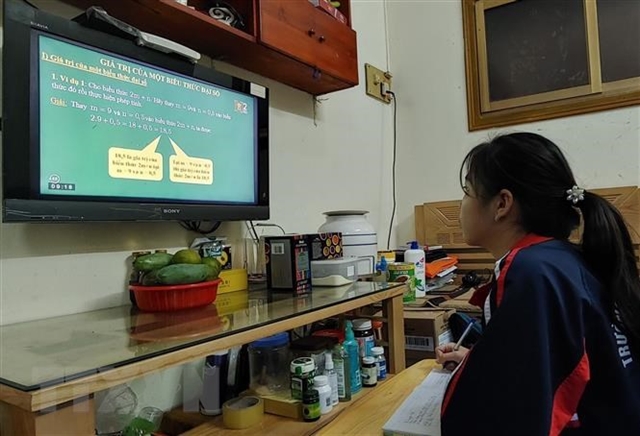 Society
Society


|
| A secondary student studies online at her house in Cầu Giấy District in Hà Nội. — VNA/VNS Photo Nguyễn Cúc |
HÀ NỘI — The Ministry of Education and Training has announced a draft circular providing three e-learning methods for the new academic year this August due to COVID-19 pandemic concerns.
Under the new circular, three online studying forms will be implemented.
In the first form, online learning will be used as a supportive means to traditional face-to-face learning.
Teachers will provide documents, study materials, assign tasks, guide and supervise students to self-study in preparation for learning in class.
In the second form, online studying will partially replace traditional studying.
Students will conduct most studying activities at home and only go to school to practise special skills such as teamwork and debate skills.
In the third form, e-learning will completely replace traditional learning. All studying activities will be carried out entirely online. This option will only be applied when students are unable to attend class, such as during the school closures across the country witnessed since February throughout April this year in a bid to curb coronavirus spread.
Thái Văn Tài, director of the ministry’s Primary Education Department, said e-learning would help student access education, especially when they are unable to go to school.
This method would also support traditional learning and create opportunities for teachers and students to access useful resources on the internet.
Through e-learning, both teachers and students will improve their computing and technological competences, problem-solving and self-study skills.
Tài said the draft decree should be suitable for both teachers and students’ abilities and should not put pressure on them.
Regular assessments of students' learning performance would be carried out online. However, the periodic assessments would be carried out directly at schools.
Teachers will participate in training courses to improve their online teaching skills, he said.
The ministry is now collecting public opinions on the draft decree.
If the draft is approved, schools will develop their own e-learning regulations and make it known to teachers, students and parents before implementing it in the new academic year. — VNS




